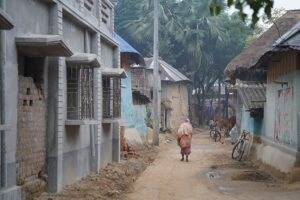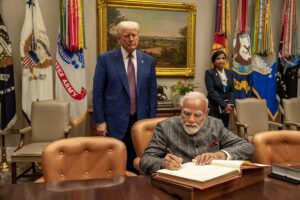The Role Of Museums In Telling Missing Stories

Museums help societies grapple with the legacies of difficult histories, such as conflict and displacement (Amy-Leigh Barnard Unsplash)
On May 18, 1942, Denzo Umino stood before the Aliens Tribunal in the remote town of Hay, New South Wales in Australia, to appeal his World War Two internment. Umino was a laundryman of Japanese descent who had been an Australian resident for 36 years, was married to an Australian woman and had an Australian-born son.
Douglas Umino, 21, also appeared before the Tribunal that day. “I was born here and raised here, and most of my friends are Australians. I am more Australian in outlook than Japanese. Up ’til now, until you told me I was put in here owing to my parentage, I do not know why I was put in here at all,” he said.
Both appeals were refused. Father and son remained locked up as “enemy aliens” in remote camps until after the war ended in 1945.
Few people know about the Uminos’ plight or that of the 4,300 other Japanese civilians interned in Australia in the 1940s. This chapter of history is missing from the national story.
Almost eighty-two years to the day after Denzo Umino’s appearance, International Museum Day on May 18 provides an opportunity to think about whose stories are told and whose are left out when we commemorate the past. Denzo Umino’s story is a case in point.
Australia was not alone in its treatment of civilians of Japanese descent. In Allied countries across the Americas and the Pacific — Brazil, Canada, India, Mexico, Peru and the United States — innocent civilians were uprooted, interned, dispossessed and expelled.
More than 120,000 Japanese civilians were interned in the United States, and 22,000 in Canada. Most of the Japanese civilians who had been interned in Australia were forcibly repatriated to Japan in 1946.
This caused much distress, as some had been living in Australia for more than 50 years. Only those who were born in Australia, had naturalised or had an Australian or British-born spouse were allowed to stay.
In the wake of World War Two, many of these countries expanded their protections of their citizens. It is difficult to imagine the mistreatment of the 1940s meted out to citizens in most of the places where the internments occurred. But non-citizens can still be rounded up, displaced, detained without due process and deported.
While numerous exhibitions, films, photographs and books have documented the internment of Japanese civilians in the United States and Canada, what happened in Australia has had scant coverage.
Museums as sites of inclusion and healing
This gap is an important reminder of the special social role of public museums. By telling stories of peoples and places, they help to create a sense of community and shared identity. They also help societies grapple with the legacies of difficult histories, such as conflict and displacement.
The international project Past Wrongs, Future Choices is committed to telling the story of the injustices perpetrated against people of Japanese descent around the world in the 1940s. It is the first project of its kind to connect the histories of people of Japanese descent in Allied countries throughout the Americas and the Pacific.
Community is an important part of this process.
One of the project’s partners in Australia is the community organisation Nikkei Australia. This group is working with museum professionals, scholars and arts practitioners to consider the meaning of this history today and how museums might help to carry the burden of this history. More than 80 years on, they ask what we can learn from the failures of the past.
In the past few decades, museums around the world have hosted important exhibitions supporting processes of truth-telling and reconciliation. These include exhibitions in Canada responding to the ongoing consequences of its Residential School System and the dispossession of Japanese Canadians, and in Australia addressing the forced removal of Indigenous children from their families.
The social and democratic contributions of museums are underpinned by the public trust that they hold. A 2021 survey by the Council of Australasian Museum Directors revealed that museums remain one of the most trusted types of organisation amongst the public.
With this trust comes immense responsibility. Anthropologists Kathryn Lafrenz Samuels and Jon D. Daehnke point out that cultural heritage can produce social harms as well as social goods. Decisions about whose stories are told and how to commemorate the past contribute to a sense of who ‘the people’ or ‘the public’ are — who is included and who is excluded.
American feminist historian Gerda Lerner, jailed in 1938 for her resistance to the Nazi takeover of Austria before escaping from Europe, knew that “history is not a recipe book”. The horrors she had seen as a Jew in Europe would not be repeated in their particulars. But, she argued, “we can learn by analogy”.
British historian John Tosh explains: “The whole point of an analogy is that it notes similarities in things which in other respects are unalike.” Provided we are open to both similarity and difference, “the effect is to liberate our thinking from the rigidities of current discourse, not by prescribing a course of action but by expanding our sense of the options.”
An analogy for our times may well be the story of Australia’s Japanese community, who were interned without legal protection against the might of the state. Their story demands that we examine what we owe each other, as humans, in times of conflict.
On International Museum Day, these questions also call on museums as spaces of truth-telling, reflection and inclusion to help guide the way.
(Originally published under Creative Commons by 360info™. Read the original article here)





